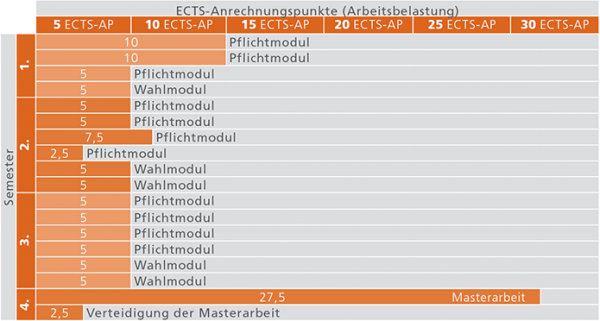Masterstudium Material- und Nanowissenschaften
Curriculum (2009W)
Master of Science (MSc)
Dauer / ECTS-AP
4 Semester / 120 ECTS-AP
Studienart
Vollzeit
Sprache
Deutsch
Voraussetzung
Fachlich infrage kommendes Bachelorstudium oder Äquivalent und Sprachnachweis
Fakultät
Fakultät für Chemie und Pharmazie
Niveau der Qualifikation
Master (2. Studienzyklus)
ISCED-11: Stufe 7, EQR/NQR: Stufe 7
ISCED-F
0588 Interdisziplinäre Programme und Qualifikationen mit dem Schwerpunkt Naturwissenschaften, Mathematik und Statistik
Studienkennzahl
UC 066 657
Das Curriculum ist die Grundlage eines Studiums. Mit einem Blick auf das Curriculum zum Master Material- und Nanowissenschaften erhältst du einen detaillierten Überblick zu Aufbau, Inhalt, Prüfungsordnung und Qualifikationsprofil dieses Masters.
Durch das Curriculum können mehrere wichtige Fragen bereits vor Studienbeginn geklärt werden. Zum Beispiel welche Kriterien für die Anmeldung zum Masterstudium Material- und Nanowissenschaften erfüllt werden müssen, wie lange das Studium dauert, welche Module zu absolvieren sind und vieles mehr.
Für das Masterstudium Material- und Nanowissenschaften gilt aktuell das Curriculum 2009W.
Informationen zum Curriculum (2009W)
Die Gesamtfassung des Curriculums spiegelt das aktuell gültige Curriculum wider, ist rechtlich unverbindlich und dient lediglich der Information. Die rechtlich verbindliche Form des Curriculums inkl. etwaiger Änderungen finden Sie in den entsprechenden Mitteilungsblättern.
Die Information, welche Curriculumsversion für Sie gilt, entnehmen Sie bitte Ihrem Studienblatt
abrufbar unter: https://lfuonline.uibk.ac.at/public/lfuonline_meinestudien.studienblatt
Spalte: Curriculum in der geltenden Fassung
- Curriculum/Gesamtfassung (ab 01.10.2019)
- Mitteilungsblatt vom 28.06.2019, 66. Stück, Nr. 580 (Änderung des Curriculums)
- Curriculum/Gesamtfassung (ab 01.10.2016)
- Mitteilungsblatt vom 15.06.2016, 42. Stück, Nr. 457 (Äquivalenzliste)
- Mitteilungsblatt vom 09.05.2016, 27. Stück, Nr. 397 (Änderung des Curriculums)
- Curriculum/Gesamtfassung (tritt mit 01.10.2011 in Kraft)
- Mitteilungsblatt vom 21.09.2011, 39. Stück, Nr. 556 (Berichtigung der Verlautbarung der Änderung des Curriculums)
- Mitteilungsblatt vom 08.06.2011, 26. Stück, Nr. 461 (Änderung des Curriculums)
- Mitteilungsblatt vom 25.11.2008, 13. Stück, Nr. 81
Voraussetzung
Fachlich infrage kommendes Bachelorstudium an der Universität Innsbruck:
- Bachelorstudium Chemie
- Bachelorstudium Bau- und Umweltingenieurwissenschaften
- Bachelorstudium Physik
- Bachelorstudium Geo- und Atmosphärenwissenschaften
- Bachelorstudium Atmosphärenwissenschaften
- Bachelorstudium Erdwissenschaften
Nachweis der Allgemeinen Universitätsreife:
Die allgemeine Universitätsreife für die Zulassung zu einem Masterstudium ist durch den Abschluss eines fachlich in Frage kommenden Bachelorstudiums, eines anderen fachlich in Frage kommenden Studiums mindestens desselben hochschulischen Bildungsniveaus an einer anerkannten inländischen oder ausländischen postsekundären Bildungseinrichtung oder eines im Curriculum des Masterstudiums definierten Studiums nachzuweisen. Zum Ausgleich wesentlicher fachlicher Unterschiede können Ergänzungsprüfungen (maximal 30 ECTS-AP) vorgeschrieben werden, die bis zum Ende des zweiten Semesters des Masterstudiums abzulegen sind.
Das Rektorat kann festlegen, welche dieser Ergänzungsprüfungen Voraussetzung für die Ablegung von im Curriculum des Masterstudiums vorgesehenen Prüfungen sind.
Empfohlener Studienverlauf
Der unten angeführte, exemplarische Studienverlauf gilt als Empfehlung für Vollzeitstudierende, die das Studium im Wintersemester beginnen. Die Aufstellung dient der Darstellung eines möglichen Studienablaufs und ist nicht verpflichtend. Etwaige Prüfungswiederholungen bzw. deren studienzeitverzögernde Wirkung sind nicht berücksichtigt.
Die Regelstudienzeit beträgt 4 Semester bzw. 120 ECTS-AP, wobei gemäß Universitätsgesetz die Arbeitsbelastung eines Studienjahres 1.500 (Echt-)Stunden zu betragen hat und dieser Arbeitsbelastung 60 Anrechnungspunkte zugeteilt werden (ein ECTS-Anrechnungspunkt entspricht einer Arbeitsbelastung der Studierenden von 25 Stunden).
10,0 ECTS-AP: Pflichtmodul
10,0 ECTS-AP: Pflichtmodul
5,0 ECTS-AP: Pflichtmodul
5,0 ECTS-AP: Wahlmodul
5,0 ECTS-AP: Pflichtmodul
5,0 ECTS-AP: Pflichtmodul
7,5 ECTS-AP: Pflichtmodul
2,5 ECTS-AP: Pflichtmodul
5,0 ECTS-AP: Wahlmodul
5,0 ECTS-AP: Wahlmodul
5,0 ECTS-AP: Pflichtmodul
5,0 ECTS-AP: Pflichtmodul
5,0 ECTS-AP: Pflichtmodul
5,0 ECTS-AP: Pflichtmodul
5,0 ECTS-AP: Wahlmodul
5,0 ECTS-AP: Wahlmodul
27,5 ECTS-AP: Masterarbeit
2,5 ECTS-AP: Verteidigung der Masterarbeit

| Semester | ECTS-AP | Titel |
|---|---|---|
Erweiterung des Studiums
Im Rahmen dieses Studiums kann das Erweiterungsstudium Entrepreneurship im Umfang von 45 ECTS-AP oder das Erweiterungsstudium Informatik im Umfang von 60 ECTS-AP absolviert werden. Die Zulassung zur Erweiterung setzt die Zulassung zu einem oder den bereits erfolgten Abschluss eines ausgewählten Studiums voraus. Weitere Informationen sind abrufbar unter:
Informationen zur Prüfungsordnung inkl. Bewertung und Benotung
Prüfungsordnung
Die Prüfungsordnung ist integraler Bestandteil des Curriculums, detaillierte Informationen finden Sie unter dem Paragrafen Prüfungsordnung.
Bei der Notenverteilungsskala handelt es sich um die statistische Darstellung der Verteilung aller positiv absolvierten Prüfungen, die innerhalb eines Studiums bzw. eines Studienfaches (unter Heranziehung aller gemeldeten Studierenden eines Studiums bzw. eines Studienfaches) erfasst wurden. Die Notenverteilungsskala wird in regelmäßigen Abständen aktualisiert.
| A | B | C | D | E |
|---|---|---|---|---|
| Österreichische Notenskala | Definition | %-Satz | ||
| 1 | SEHR GUT: Hervorragende Leistung | 41,3 | = 100% | |
| 2 | GUT: Generell gut, einige Fehler | 27,1 | ||
| 3 | BEFRIEDIGEND: Ausgewogen, Zahl entscheidender Fehler | 18,6 | ||
| 4 | GENÜGEND: Leistung entspricht den Minimalkriterien | 13 | ||
| 5 | NICHT GENÜGEND: Erhebliche Verbesserungen erforderlich, Erfordernis weiterer Arbeit |
Dezember 2021
Gesamtbeurteilung der Qualifikation
Nicht zutreffend
Erklärung: Eine Gesamtbeurteilung (mit Auszeichnung bestanden, bestanden, nicht bestanden) wird nur über eine studienabschließende Prüfung, die aus mehr als einem Fach besteht, vergeben (im Curriculum dieses Studiums ist diese nicht vorgesehen).
Formulare
- Prüfungsprotokoll
- Anmeldung der Masterarbeit (inklusive Exposè)
- Beurteilung des Pflichtmoduls: Vorbereitung Masterarbeit
- Deckblatt der Masterarbeit
- Ansuchen um Anerkennung von PrüfungenUNDBeiblatt
- Antrag um Zulassung zur dritten und vierten Wiederholung einer Lehrveranstaltungsprüfung
Formulare und Ablauf der Einreichung der Masterarbeit (gültig seit 01.11.2023)
Kontakt und Information
Prüfungsreferat
Standort Innrain 52d
Studienbeauftragter
Priv.-Doz. Dipl.-Ing. Dr. Engelbert Portenkirchner
Studiendekan
assoz. Prof. Dr. Thomas Müller
